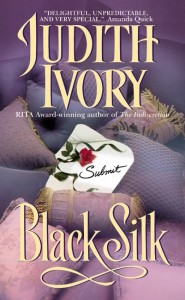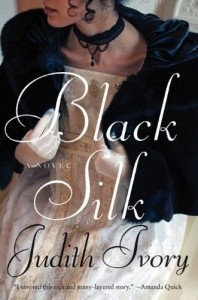Judith Ivory’s BLACK SILK: a review by Del, with help from Ruthie
Del:
Judith Ivory’s BLACK SILK is a weird, weird book and I can hardly express how much I love it in all its wonktastic glory…but of course I’m going to try.
Some Background

This is one of those books people tend to either love or hate. No, seriously. The reviews on Amazon really tell the story, and it’s no surprise they tend to cluster heavily around the 1-star and 5-star ratings. A sampling of those reviews:
- “In this story the heroine is described as hairy, with crooked teeth. He is decribed [sic]as frivilous [sic], a dandy that cares more about his fobs on his vest than people, and utterly irresponsible. Throughout most of the book she holds him in utter disdain and can barely tolerate him.” – Duchess1968
- “The romance develops over quite a length of time, and very slowly; this book is not particularly steamy. Probably the most objectionable thing about Black Silk is that for more than three-quarters of the novel, Graham’s primary sexual relationship is not with Submit.” – Mlle. X
- “I don’t know how they called this book a romance. The two main characters hardly ever interacted with each other until the last 1/4 of the book. The hero was in another relationship with another woman during almost the entire book.” – msjaimemd
- “There’s only one sex scene in this book, so if you’re looking for lots of action, this will not be a read you’ll enjoy.” – K.B.
- “The book was like a ball of yarn full of knots that you’re trying to unravel; every time you think you have it all sorted out you find another knot, every time you think you’ve found the beginning piece, you pull it out to find that it’s just a scrap, disconnected from the rest of the skein.” – J.P.
- “Black Silk certainly isn’t for the mainstream romance readers who wants [sic] their novels fast and snappy.” – Desmond Chan
- “I have to agree with some of the other reviewers, this is not really a romance.” – ladyisis2004
Here’s an interesting thing – the quotes above come from reviews that run the gamut from one star to five (there’s even one reviewer who openly wishes for a zero-star option). Can you tell which quotes came from positive reviews, and which came from negative ones?
Another interesting bit – no matter the rating, everything in the above reviews is accurate. I think to a certain extent people loved or hated the book based on the same elements. One person’s poison is another person’s cure. This is perhaps a hallmark of wonkomance, and BLACK SILK is one of the wonkiest I have ever read, a true classic of wonk.
The Characters (and just a fraction of their story)
 The heroine, Submit Channing-Downes (yes, there’s a lot of backstory behind that name) is the recent widow of a man 43 years her senior, to whom she was married at the age of sixteen. She is twenty-eight when he dies, and through most of the book she is genuinely mourning for him, because she loved him and felt a great kinship of spirit with him despite the age difference. We learn almost as much about her views on her relationship with the late Henry as we do about her relationship with the hero, Graham Wessit. Adding to the wonk quotient: Submit is described in a way that makes it clear she is no beauty. Not the romance book “not a conventional beauty” thing, but actually a bit funny-looking.
The heroine, Submit Channing-Downes (yes, there’s a lot of backstory behind that name) is the recent widow of a man 43 years her senior, to whom she was married at the age of sixteen. She is twenty-eight when he dies, and through most of the book she is genuinely mourning for him, because she loved him and felt a great kinship of spirit with him despite the age difference. We learn almost as much about her views on her relationship with the late Henry as we do about her relationship with the hero, Graham Wessit. Adding to the wonk quotient: Submit is described in a way that makes it clear she is no beauty. Not the romance book “not a conventional beauty” thing, but actually a bit funny-looking.
Graham, however, is very well-favored. He is perhaps best described as a rake, but unlike the typical romance rake Graham is in no particular hurry to reform. And most (though not all) of the rumors about his dissipation are absolutely true. When the book opens he’s the subject of a paternity suit. He has two older children he never sees. Through most of the book he’s still sleeping with his mistress (she’s married…her husband dotes on her). Oh, and did I mention he was the ward of Submit’s elderly husband, so to the extent they know one another already, it’s because she is in a certain sense his surrogate stepmother? Yes, there’s that, too. Layer upon layer of fucked-up-ness, like an unholy but delectable cake of wonk.
The characters don’t really want to become involved with one another. Indeed, they really don’t want to become involved with one another. Fortunately for them, in that regard, they spend most of the book in different cities. This is probably why, as one of the quoted reviewers point out, they only have one sex scene; they’re rarely physically close enough to make out, much less have sex. On the whole, it’s such an atypical romance that one wonders how she snuck it past the publisher under the “romance” label.
So why read this? I’m going to ask Ruthie to help me out with that, because she knows lots of cool academic terms for the reasons, I’m sure. Ruthie, why should people read BLACK SILK? *passes the baton*
Why You Should Read It

The book was originally released under Ivory's other nom de plume, Judy Cuevas. It had one of the least representative covers EVER!
Ruthie:
So many reasons! I could give you some really high-falutin’ answers, like that it’s beautifully written and the characterization is exquisite and amazing and so, so impressive. But here’s what sticks with me: when I finally got to the last scene, after waiting an ETERNITY for Graham and Submit to get together, I highlighted, like, the entirety of the last ten pages of the book on my Kindle. Even though I never highlight anything on my Kindle, and even though I have no use for highlighting, and even though it was silly. I just couldn’t help myself. I had to underscore how delighted I was with everything about the ending of the book. LET ME PAUSE TO UNDERSCORE.
And of course it wasn’t so much that the scene itself was spectacular as that I was so invested in both characters, so intrigued by them and their romance, so ready for them to be together finally, despite all the reasons they shouldn’t be. Because this is not a book where the characters are obviously right for each other on page 12. It’s not even a book where they obviously become right for each other by the end because the “bad” character transforms. That’s what I thought it was going to be, in fact: what I think of as a “romance of regard,” where the hero has to become worthy of the morally superior heroine’s regard (or occasionally vice versa). No, this is a book where the characters are wrong for each other AND right for each other. Where they’re allowed to remain imperfect, to cherish each other’s imperfections, and finally, in the end, to tell each other, “You are so wrong about this, it is insane. I know what you need, and you don’t. Allow me to demonstrate.”
I think BLACK SILK is a book about how love is often uncomfortable. It is an understuffed Victorian settee of a novel, with hard edges. It is not the kind of couch-book where you can lay back and luxuriate in escape. No. What it is is a book about people — deeply flawed, deeply human, deeply interesting people — and life, and “bewildering gifts from the dead,” and love.
It is deeply wonked. And I adored it.
And Another Thing…
Del: *snatches baton back* What Ruthie said! Buy this beautiful piece of wonkitude at the following fine e-stablishments:






















This sounds AMAZING!!! I am going to buy it immediately. You hear readers say things like, “The hero can’t sleep with any other women after he meets the heroine,” and I always disagree. Love ain’t so neat.
I’m also intrigued by the ugly heroine. I’m putting up a post tomorrow on how heroines have been allowed to become more normal looking, but heroes are still required to be gorgeous (or at least have gorgeous muscles). Writing an ugly hero that readers love seems like an excellent challenge.
Thanks for the great review!
Yay! It really is an odd one. It has a rhythm all its own. Re: the ugly hero, I’m hoping that some of us in the mommypr0n group end up addressing that a little – at least more normal-looking heroes, I think. I know I describe my hero as the guy who was the perfect romance hero…like seven years ago, before his six-pack became a four-pack (the heroine generously describes it that way). He’s still just as attractive to HER, of course.
Oh! This is one of my favorite romances, and perhaps one of my favorite books of any genre. I read it very early in my experience of the genre (maybe at the recommendation of Sherry Thomas, who never steers me wrong), and was blown away by the way it systematically takes so many conventions and either openly defies them or embodies them to the point of extremity, so that they travel past parody and back into seriousness. (Groan! I cried, when I read the back cover and realized the heroine was named “Submit.” Then by the end I was thinking, “Submit: best, richest, most subversive heroine name EVER.” Groan! I cried when I realized that the hero would be sexually dallying, largely out of inertia, with another woman for much of the book. Then that emerged as a profoundly complex driver of the themes of the novel. And so on.)
Here’s the odd thing: I adore this novel, and recommend it to everyone I meet with an interest in the genre (often I recommend it as the gateway book for friends who have never read a romance because they fear for the quality of the writing), but I have never, EVER been able to reread it. I think it just lurks in my mind as a phenomenal romance built on a fair amount of suffering, and it was so effective that I can’t bear to go back to the time before the characters had their HEA.
Yes, yes, yes, to all of that. Even the bit about re-reading. There are some wonkomances I read over and over, despite the pain. But others, and this is one (for now, at least) I view as self-consuming artifacts, in a sense. The experience of reading it is so complex, so visceral, that I’m acutely aware of my own part as a reader in constructing the narrative and subtext. If I read it again there’s a sense in which I would not be reading the same book because my experience would be so different the second time around, with foreknowledge.
I like the way you said it better, though :-D I don’t want to go back to the time before they went through all the crap, knowing they’ll have to go through it again!